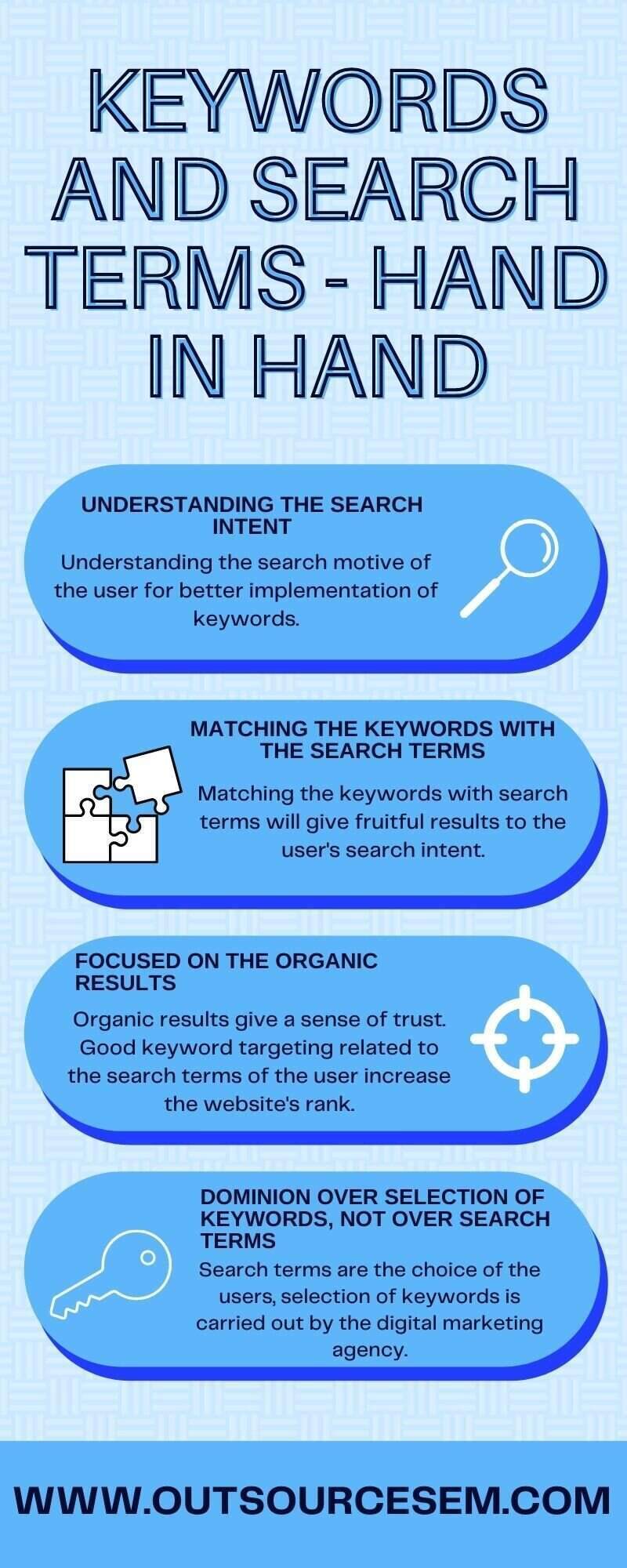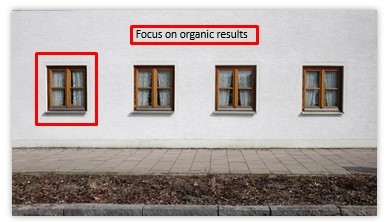One of the biggest challenges in digital marketing is to be completely aware of the large set of terminology. Whether it is search engine optimization or PPC advertising, numerous terms intend to have the same meaning but are different in practice. Even among experienced advertisers, a common issue is using the terms “keyword” and “search term”. As there are myths surrounding PPC advertising and search engine optimization myths that must be kept at bay; similarly, you need to have a crystal-clear idea of the difference between keywords and search terms. Both are critical components to focus on in your digital marketing strategy and are closely related yet have different meanings.
The digital marketing world holds together an enormous volume of internet surfers and the service providers who utilize online platforms to run SEO campaigns. To use this massive platform, the first step that is performed is searching. Searching requires a medium to type and search and the medium is search engines. The search engines provide the facility to find anything related to any query in digital media, and the name self describes this feature. The search engines focus on users' interests or concerns when displaying the relevant results.
The first thing a user does in searching and achieving the desired result a user is going to execute is to type something on the search bar. The words that will be organized to solve the user's search intent are called search terms. Search terms are the exact words used by the internet surfer. It might sound confusing as the definition of keywords is quite similar, then what is the difference? This is a common question that needs to be answered. E.g., Suppose a user enters the search term - which is the best content marketing firm? Keywords - Content marketing firm, best content marketing, SEO content marketing, PPC content marketing, etc.
The search keywords vs. search terms is not a complex topic to understand but a mandatory topic to be aware of, especially for its value in the SEO search intent. The best SEO marketing companies apply a lot of research and analysis to correctly match the search terms with the keywords they are going to select for the particular search query.
What are search terms?
When an internet user enters his search intent on the search engine to get related results, it is known as the user’s search term. A search term can be long, short, adequately framed, unorganized sentences, or anything the user types. The pages that come up are the user's search results. The search term may vary from user to user according to their search intent and understanding of the search engine. The search engines will show the SERPs with a high SEO ranking.
• User 1 - Where to find the best black boots in California?
• User 2 - Best black boots?
• User 3 - Black boots in California?
• User 4 - Black boots?
Search terms and keywords are co-related. The combination of words used by the internet surfer should match the keywords that the digital marketer has chosen to promote the brand to generate positive results for the business
What are keywords?
Keywords are the phrases selected by the advertiser or SEO organization to match the user search query on the internet. The advertisers use a combination of different keywords for different search topics to rank high in the SERPs by keyword targeting.
Search volume of the keywords tells about the keyword popularity and if that keyword fits appropriate for any brand to promote their product, then the keyword is selected. Sometimes a high search volume doesn’t necessarily fall under the related keywords category. E.g., XYZ brand sells dark chocolate in Newyork and the brand chooses a keyword, i.e., Germany dark chocolates; even though the search volume of Germany dark chocolates is very high but the location in the keyword will be irrelevant. Irrelevant keyword selection will not lead to conversions but may attract traffic.
The main aim of selecting keywords is to increase the conversion rate. If the related keywords are selected, they will give both traffic and conversions, but the wrong keywords will only provide traffic or maybe not. Keyword research is necessary to get positive results and for this, Google Ads can be used. In Google Ads, you can select the keyword planner tool and discover or search keywords relevant to your product. It shows too many keyword examples for particular keyword research, so the agency has a wide choice to select from. Mostly short-term related keywords are selected but choosing some long-tail keywords will also give benefits.

What are long-tail keywords?
Long-tail keywords are particularly used when a specification is required to promote the product. Suppose you are in a business of low-cost 5g mobile phones; selecting a general keyword like mobile phones won’t give desired results. The search volume for these keywords is generally low, but the detailing is precise. A long-tail keyword- “low-cost 5g mobile phones” would be more beneficial and convenient to use. This is an optimized way of keyword targeting. General keywords and long-tail keywords both should be used in a manner that helps in enhancing the traffic to the website and also generate results, i.e., conversion.
Keywords and search terms: hand in hand

Keywords and search terms both go hand to hand. Keyword research to select the related keywords can only be fruitful if knowledge about the users' search intent and the offered products are well understood. The user’s intent is the digital marketing company’s SEO search intent; if the selection of keywords fulfills the user's concern, great results will follow, boosting SEO marketing.
• Understanding the search intent - Search intent is the motive of user’s when they look for something in the search bar. It may be for acquiring information about any topic, buying a product, or navigating to a specific website. When the digital marketing company understands the intent, it becomes easy to select relevant keywords to serve the purpose of the users. Also, using the target keywords in the title tag and meta description helps the users to get the best idea about the website. If the organization fulfills users' search intent, then the bounce rate will be low and the ranking of the website will eventually increase and improve.
Improving the ranking of the website is very important. If the website is ranking higher in the search engine result pages, it will consciously send a positive signal to the users that this is one of the best websites related to the users' query. Most of the users don’t navigate to the second page of the SERPs. They tend to find the solution to their concern on the first page, so it is one of the essential factors to rank on the first page in the top 5 results. Therefore it is very necessary to understand the search intent and conduct keyword research to select the best-related keywords for the products or services being offered.

• Matching the keywords with the search terms - Everyone phrases their search term differently, but it becomes quite tough for a company to match the keywords with every query. You need to reach a focal point where most of the search term matches the related keywords. Sometimes the selected keywords that are being used to promote the products will match exactly with the search term and sometimes, it would match partially. If the understanding of the target audience is there, then matching the keywords with the search terms becomes a bit easy.
The keyword is one of the factors of SEO planning that will boost the SEO; other optimization processes should also be well taken care of. Search engines also match the user's search query with the keywords you chose if it seems relevant or similar to the words used. E.g., if someone types - find a coffee house in Ontario, and your keyword is ‘coffee house location Ontario’, it will show your website to the user if other aspects of your SEO strategy are also brilliant.
• Focused on the organic results - The search results that users find more useful are the organic results. The user's search intent is to mostly find top organic results in the result pages related to their query and for you to rank your website high on result pages, the use of related keywords and proper keyword mapping is essential. In addition, the title tag and meta description should also contain the target keywords related to the search term of the user.
The foremost task of a user is to find the relevant website on the search engine result pages, so proper keyword selection and mapping are very much important. Once the user locates your page, it gets easy to promote the product or offer the services you deal with. E.g., Suppose your digital marketing company deals with SEO services, PPC services, content marketing services, email marketing, social media marketing etc., and the candidate is seeking one of the services you provide. In that case, you need to optimize your website to rank high. The use of adequate and related keywords will help to achieve this part. Therefore, understanding the user's search intent and initializing keyword research for related keyword selection is necessary. Once the users find you, then promoting becomes effortless.

• Dominion over selection of keywords, not over search terms – The digital marketing organization has authority over keyword targeting; they can conduct a Google Ads keyword research and choose the most related keywords for their marketing strategy. On the other side, search terms are under the control of the users. Search keywords vs. search terms are not different from one another but are very much interrelated. Every user is different and the way they search for anything on the internet also varies. E.g., If the users are trying to find ways to invest in shares, their search terms can be distinct for the same query.
1. Ways to invest in the share market.
2. Best stocks.
3. How to grow a passive income.
4. Second income options.
5. Good investment plan to increase money.
6. Best investing consultant.
7. Phone number of investment planner.
The motive of all of the above search terms is to find a solution to grow their ROI. The SEO search intent of the users here is very clear and the share market agency needs to come up with the best keywords through research to provide a solution to these target audiences. They can conduct this research themselves or outsource a digital marketing agency with adequate knowledge to develop the best keyword strategy.
The goals of the digital agency differ for different products. For a newly built product, the strategy would attract more and more traffic to the website. An increase in traffic will help in building brand awareness and the reason why the awareness-building strategy will work is that the keyword targeting was done right. When keywords are coordinated well with the search terms by the digital marketing agency, it gives handy results in SEO marketing.
If the company's goal is to increase sales, then attracting traffic will not be the main moto. The target audience should reach the bottom of the sales funnel to increase sales. For sales, the keywords should describe the qualities of the product. E.g., If your company is in the business of birthday cakes, then the keyword should announce it upfront.
• Buy best birthday cakes
• Buy chocolate cakes
There are different SEO keyword strategies for the goals you set to achieve. Through these keywords, you are announcing that the focus is on sales; you want your target audience to buy your product. The knowledge of the users' search intent will shape your keyword strategy. This will enhance the outcome of the desired results.
Assigning too much weightage to the search term and keywords is essential because it is the first step in SEO marketing. Customer satisfaction, quality of content, number of services, etc., will follow only after the user has reached their search destination, which will become possible because of the related keyword mapping.
Conclusion
Search terms and keywords both compliment each other for strong SEO marketing. Keywords, when matched adequately with the search terms of the users, can give very positive results in SEO marketing if any digital marketing company conducts thorough research to understand the search intent of the users. Keyword planner tools provide proper insight into the popularity of related keywords. The selection of keywords from the related keywords examples or samples is a task that needs very careful implementation. It becomes a priority task for the online marketing agencies to dedicate a good amount of time and effort to syncing the search terms and keywords to achieve favorable results. If you're having trouble attracting customers online, our team of SEO specialists can help your business - whether you're an electrician, flooring specialist, roofer, or lawyer - stand out in search results. We provide customized SEO solutions to enhance your website's visibility and generate high-quality leads. Our services cover electrician SEO, flooring SEO, roofing SEO, lawyer SEO, and small business SEO.
References:
• Search for beginners: A guide to keyword research
• Ultimate guide to in-market audiences for search
